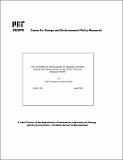The convergence of market designs for adequate generating capacity with special attention to the CAISO's resource adequacy problem
Author(s)
Cramton, Peter C.; Stoft, Steven
Download2006-007.pdf (337.8Kb)
Other Contributors
Massachusetts Institute of Technology. California. Center for Energy and Environmental Policy Research. Electricity Oversight Board.
Metadata
Show full item recordAbstract
This paper compares market designs intended to solve the resource adequacy (RA) problem, and finds that, in spite of rivalrous claims, the most advanced designs have nearly converged. The original dichotomy between approaches based on long-term energy contracts and those based on short-term capacity markets spawned two design tracks. Long-term energy contracts led to call-option obligations which provide marketpower control and the ability to strengthen performance incentives, but this approach fails to replace the missing money at the root of the adequacy problem. Hogan's (2005) energy-only market fills this gap. On the other track, the short-term capacity markets (ICAP) spawned long-term capacity market designs. In 2004, ISO New England proposed a short-term market with hedged performance incentives essentially based on high spot prices. In 2005, we developed for New England a forward capacity market, with load obligated to purchase a target level of capacity covered by an energy call option. (cont.) The two tracks have now converged on two conclusions: (1) High real-time energy prices should provide performance incentives. (2) High energy prices should be hedged with call options. We argue that two more conclusions are needed: (3) Capacity targets rather than high and volatile spot prices should guide investment, and (4) Long-term physically based options should be purchased in a forward market for capacity. The result will be that adequacy is maintained, performance incentives are restored, market power and risks are reduced from present levels, and prices are hedged down to a level below the present price cap.
Date issued
2006Publisher
MIT Center for Energy and Environmental Policy Research
Other identifiers
2006-007
Series/Report no.
MIT-CEEPR (Series) ; 06-007WP.